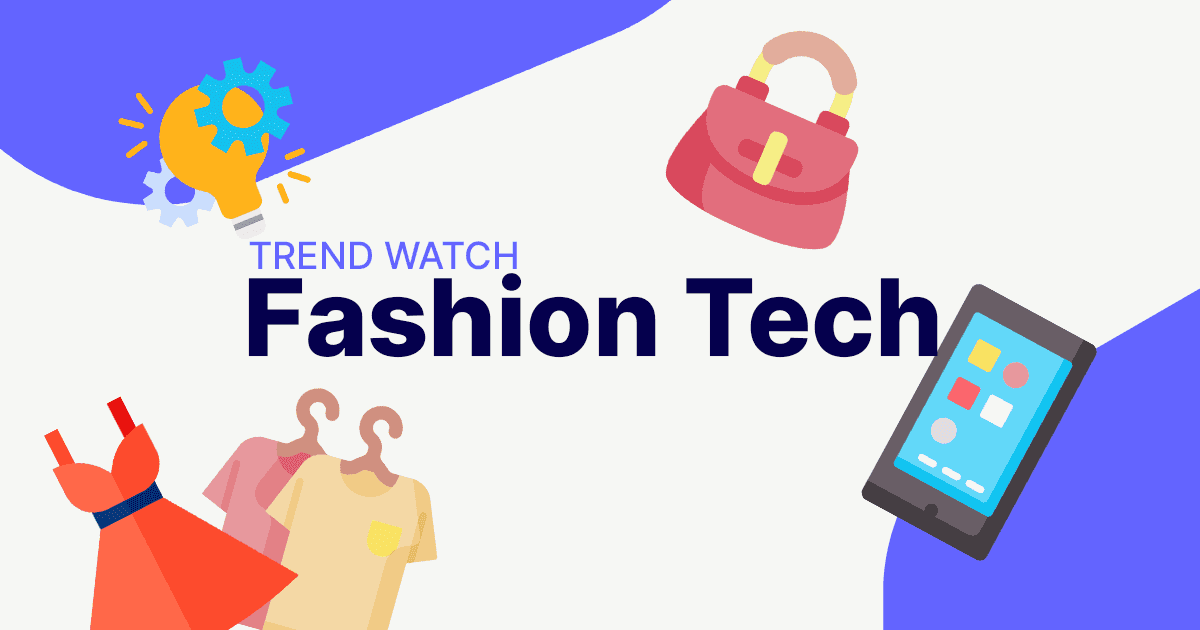Technology trends are defining the future of how consumer brands interact with their consumers. They provide established fashion brands and emerging startups and entrepreneurs an opportunity to take advantage of new technologies to create unique customer experiences, drive digital engagement, as well as generate additional revenue streams.
As one of the biggest industries in the world, it’s surprising to learn that the way fashion operates today hadn’t changed that much in the past few decades until recently. Generating an estimated $1.5 trillion a year, technological innovation in this industry was stalled due to the abundance of low-cost manual labour as a means of reducing pricey production costs.
However, nowadays fashion trends are being pushed to the masses faster than ever because of social media, training customers to want instant access to the latest trends. At the same time, younger generations are showing an increased preference for products that are tailored to their specific needs and tastes. This coupled with a more socially conscious consumer base has paved the way for exciting new technologies to disrupt one of the biggest e-commerce sectors. In fact, fashion is the largest e-commerce sector in the world, with a global market value of $759.5 billion in 2021 and expected to hit $1+ trillion by 2025.
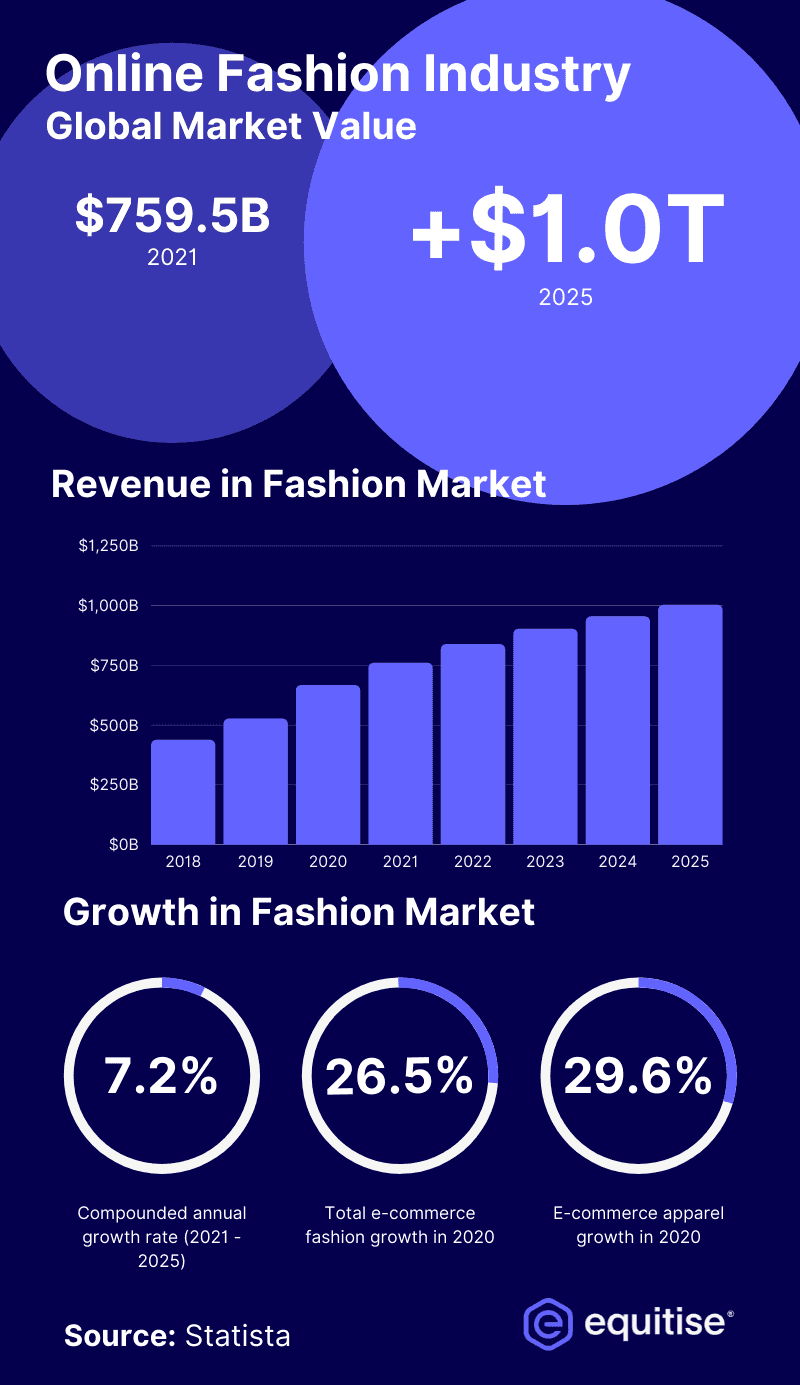
As customers' lives become increasingly intertwined with the digital world, fashion brands and startups will need to employ the latest technologies to push the limits of production, wearability and manufacturing. The following are some of the most promising technology trends for the fashion industry right now that are being leveraged by emerging startups.
Data-Driven
Data-driven fashion startups are shifting the paradigm from traditional fashion advertising and styling to data-driven product development. The results speak for themselves: over the past decade, the number of online shoppers has grown exponentially, giving companies the data to make informed decisions on consumer choices and market predictions.
The amount of data available to companies is now more than ever, with data coming from consumers’ search histories and websites, social media, and mobile apps. Fashion tech startups are using this data to deliver innovative solutions to traditional clothing sales problems. By combining data analytics with AI, retailers can discover unmet customer needs and act on them to deliver a more personalised shopping experience.
One such example of a company leveraging both AI and data is Australian fashion startup Insyze. Insyze is a unique cross-platform home for the plus size fashion market. It has identified a growing demand for plus-size women to have more clothing options that specifically cater to their size and body shape with over 70% of US women being plus-sized, but only 20% of apparel being made in plus-sizes. Since the conception of its company, Insyze has used data to drive all of its product development decisions as well as to develop a more personalised digital shopping experience.
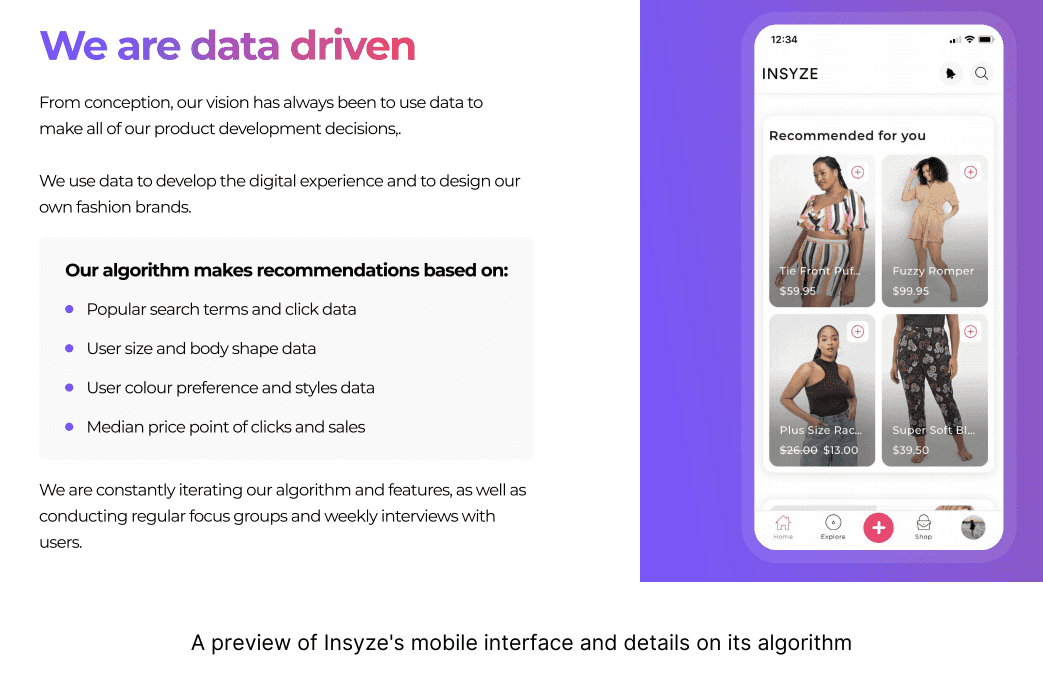
Furthermore, the continued development of its AI algorithm alongside the user data from 7k+ active users determined the brand and product direction of Insyze’s first owned brand; Dani Marie. You can invest in Insyze through its wholesale raise and share in the success of this emerging fashion tech startup.
Threadicated, another fashion tech startup, is using artificial intelligence to its full potential to provide an online styling service that delivers a truly personalised shopping experience. Using over 60 data points gathered from customers filling out their “Style Profile”, Threadicated’s AI-powered “Personal Stylist” handpicks five pieces of clothing that fit every customer’s individual taste, needs and budget. Threadicated is soon going to give people to invest in its journey with an upcoming Australian equity crowdfunding campaign on the horizon.
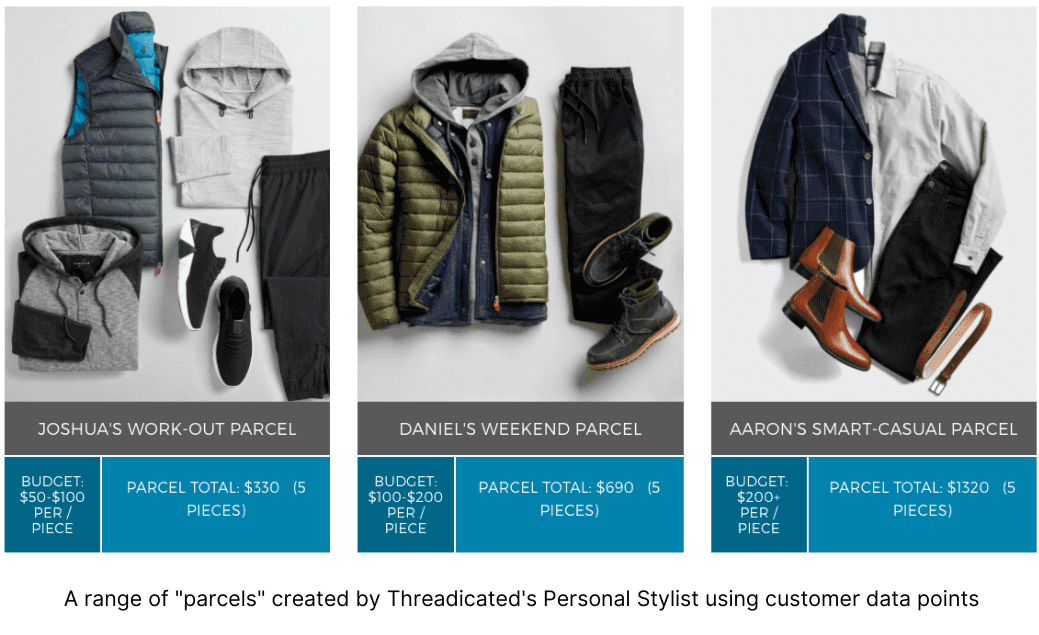
Sustainability
Fashion tech startups have emerged as one of the most promising solutions to the problems of waste and climate change, providing industry-leading solutions for developing sustainable garments and fashion-based products. These startups bring innovation to the table by providing solutions using a range of technical and creative solutions. They have been able to develop scalable production processes that don't involve the abuse of easy-to-source low cost manual labour.
When it comes to fast fashion, the era of quickly and inexpensively producing runway looks is over in favour of more eco-friendly and sustainable fashion practices. Consumers are looking for brands that take a stand for the environment, with nearly 50% of fast fashion retailers reporting a decrease in customer purchases.
Years spent working as a designer and witnessing the immense pressure placed on suppliers to deliver cheaper and faster products led Katherine Maunder to found Thread Tales. With nearly three-fifths of clothes ending up as garbage, Thread Tales set out to establish an innovative and luxury brand with sustainability at the core of its mission statement. Using a unique fabric composition using unusual fabrics such as Lotus and Seacell (made from seaweed and wood) sustainably sourced from Nepal, Myanmar and India, Thread Tales has been able to produce an exceptional product for its customers that is environmentally and ethically sound.
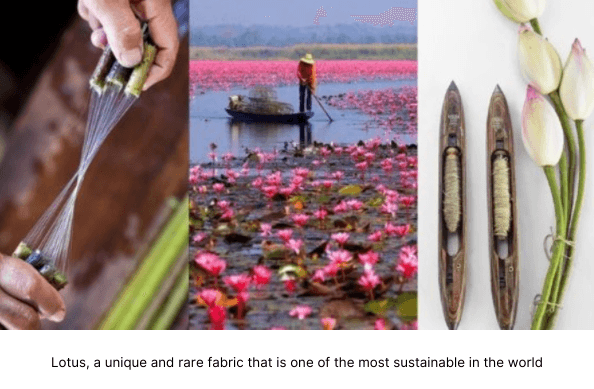
Internet of things (IoT)
The Internet of things (IoT) is everywhere. From our cars to our homes, all types of objects are communicating with each other and with outside systems in order to provide us with an improved standard of living. There has been a noticeable increase in the use of technology in everyday life over the past few years. This trend has been fueled by companies looking at ways to improve the efficiency of their operations through data collection and analysis coupled with the implementation of smart technology solutions. The fashion industry has been having to adopt new technologies and techniques in order to keep up with the constantly evolving lifestyle of its consumers. Because of this, the excitement around wearable technology has increased, and consequently so has the demand for clothing that will work with it.
As real-world interactions become increasingly mixed with online interactions, many fashion tech startups have been experimenting and pushing the limits of what can be achieved with wearable technology. Fashion tech companies are using IoT to create new kinds of tech products that allow consumers to use the internet in ways that can benefit productivity, health and performance.
One example is the Oura ring, combining advanced sensor technology and a minimal design with an easy-to-use mobile app to deliver precise, personalized health insights straight from the most reliable source: your body. With precise sensors, Oura packs state of the art heart rate, heart rate variability, temperature, activity, and sleep monitoring technology into a convenient, non-invasive ring. Around-the-clock monitoring also means that Oura understands your normal and lets you know you when something seems off.
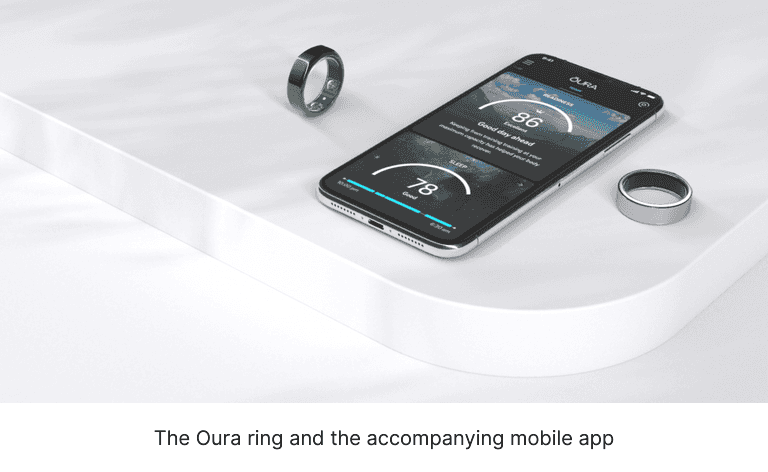
Simplification
There's a new design cycle in town - one that's delivered new items for the platforms of the world's top brands, and ones that are readying their gear for a leaner, faster, more personalized future. Fueled by COVID-19 changes, fashion is simplifying, both in its styles and in its delivery. Simplicity itself has become a commodity - a thing coveted by startups wanting to survive in a competitive industry such as the fashion industry. Instead of crowded fashion show schedules and the need for multiple different collections a year, this emerging, simplified approach focuses on the customer, and that means designing for things that they're likely to buy.
Simplifying fashion also saves money and the environment. Emerging fashion tech startups can focus more on creating and perfecting their designs, without having to produce a new collection every six weeks and worry about unnecessary waste and excess clothing production.
Troubadour has fully adopted this fashion trend, creating premium men’s bags and accessories with a minimalist approach but designed for maximum performance. Born out of a desire for a men’s overnightbag that was appropriate for the office, but not so formal as to be out of place in a more casual setting, Troubadour has been able to create a product that exhibits a modern, simple aesthetic without inhibiting performance or durability.
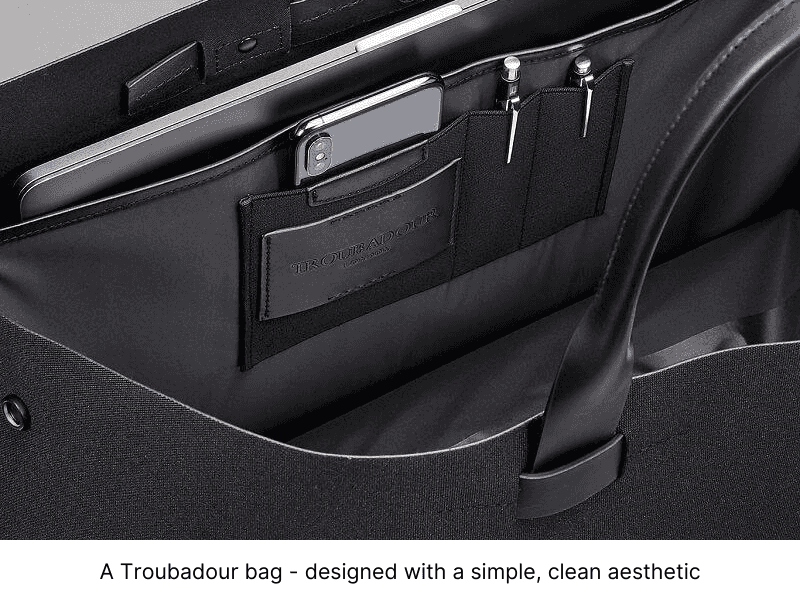
Virtual and Augmented Reality (VR/AR)
Today’s consumers are embracing new technology like never before. One of the most exciting applications of VR/AR technology is the way it is being used by fashion tech startups, allowing them to offer both brands consumers with new product options they would not have access to before. This includes allowing customers to virtually try on outfits, combining both VR and AR to empower customers with greater accuracy thanks to customised measurement functionality.
This kind of online shopping experience has allowed fashion brands to engage and retain its customers more effectively, with there being a wide-spread appeal with this more personalised shopping experience.
Holition is a fashion startup company that has embraced the virtual and augmented reality technology trend but has also taken it a step further. Holition’s FACE™ technology has enabled them to create ‘Beauty by Holition’ - a virtual diagnostic tool equipped with the most advanced facial analysis, tracking, and rendering technologies in skincare. This tool tracks over 100 points on a customer’s face and uses machine learning to conduct a range of functions such as skin health analysis and high-quality virtual try-ons of skincare and makeup products.
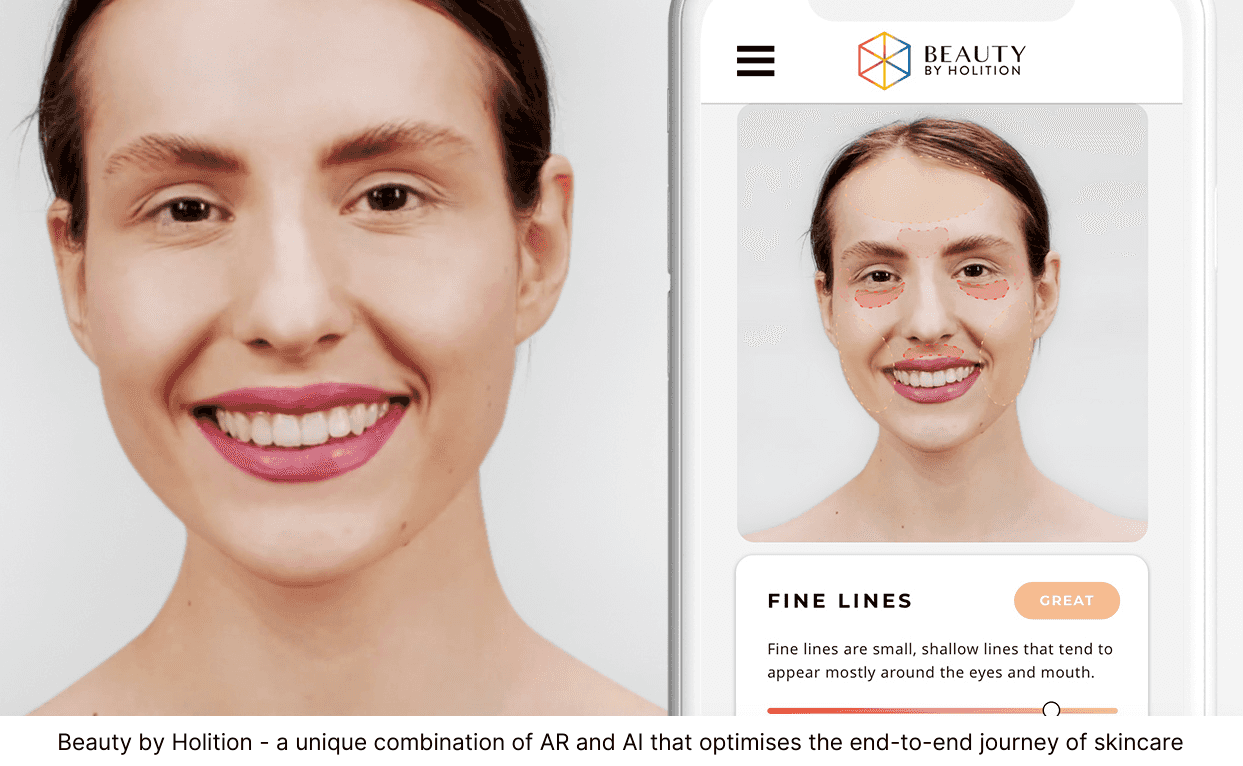
Subscribe to our newsletter below to get notified of when any Australian/New Zealand fashion startups launch an equity crowdfunding campaign. You can also see what startups you can currently invest in here.
